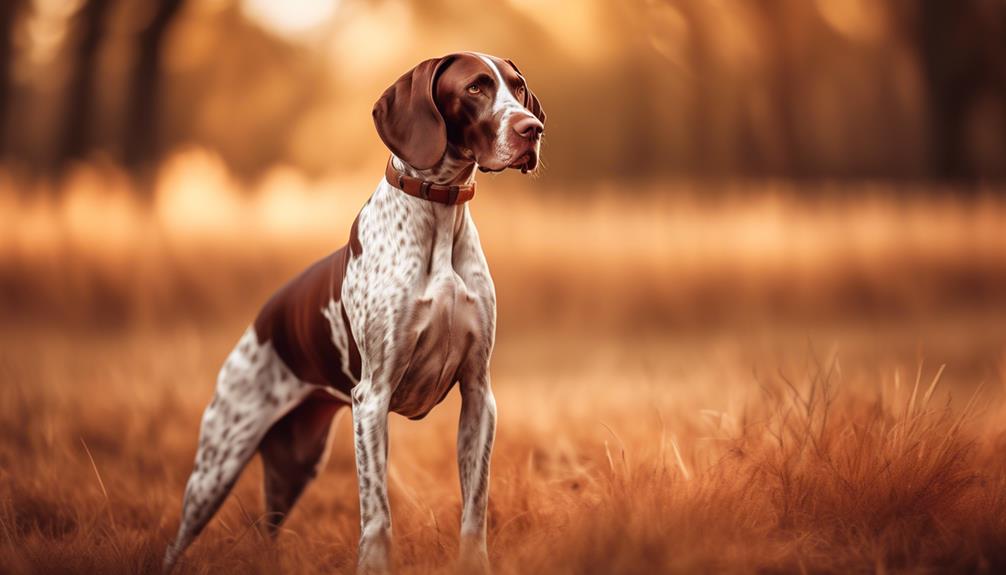
Did you know that the Portuguese Pointer is not only an exceptional hunting dog but also a devoted and affectionate family companion?
This versatile breed, originating from Portugal, possesses a unique combination of intelligence, trainability, and loyalty.
With their muscular build and short, glossy coat, Portuguese Pointers are not only visually striking but also highly adaptable to various living conditions.
But that’s not all – there are many more fascinating characteristics and traits to discover about this remarkable breed.
So, if you’re curious to learn more about the Portuguese Pointer and how they can fit into your lifestyle, keep reading to uncover all the information you need to make an informed decision.
Key Takeaways
- Portuguese Pointers are a medium-sized hunting dog breed from Portugal known for their pointing ability and sense of smell.
- They are affectionate, loyal, and make excellent family pets, as well as hunting companions.
- Portuguese Pointers are highly intelligent and easy to train, but they require plenty of exercise and mental stimulation due to their energetic and playful nature.
- They have a short and low-shedding coat, making grooming needs minimal.
Origin and Size
The Portuguese Pointer originated in Portugal and is a medium to large-sized hunting dog. They’ve a muscular build and a short, glossy coat. These dogs are versatile, excelling as hunting companions and family pets.
Portuguese Pointers are known for their pointing ability and sense of smell. They’re loyal and affectionate towards their families and make excellent companions. With their high intelligence, they’re easy to train and respond well to positive reinforcement.
Portuguese Pointers require plenty of exercise and playtime to keep them happy and healthy. They weigh between 35 and 59 pounds and stand between 20.5 and 22 inches tall at the shoulder. This breed’s size can vary, but they’re generally medium to large-sized dogs.
See another Dog breed profile.
Portuguese Sheepdog Breed
Adaptability and Living Conditions
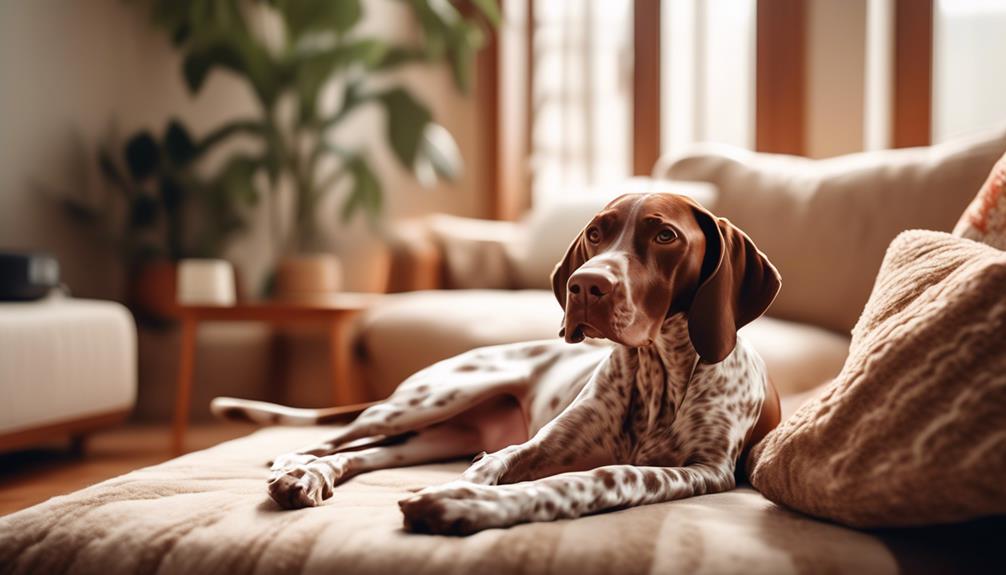
When considering the adaptability and living conditions of the Portuguese Pointer, it is important to take into account factors such as energy levels and behavior towards neighbors, rather than just their size. While they are a medium-sized breed, Portuguese Pointers can adapt well to apartment living due to their moderate energy levels and their ability to exhibit good manners towards neighbors. They are not excessively vocal and can create a harmonious living environment for everyone involved. However, it is essential to prioritize qualities such as being quiet and low-energy when choosing a dog for an apartment. To evoke an emotional response in the audience, here is a table showcasing the adaptability and living conditions of the Portuguese Pointer:
| Adaptability and Living Conditions |
|---|
| Apartment Living |
| Size alone should not be the sole determinant for apartment suitability |
| Consider energy levels and behavior towards neighbors |
| Certain small breeds with high energy can still thrive in apartments |
| Prioritize qualities such as being quiet, low-energy, and exhibiting good manners |
Behavioral Traits
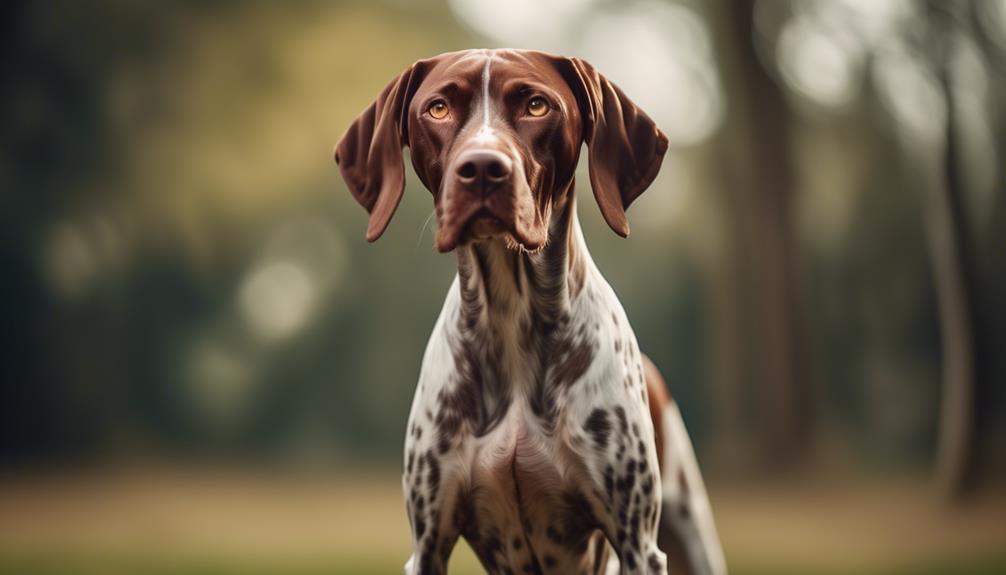
Now let’s explore the behavioral traits of the Portuguese Pointer, shedding light on their temperament and tendencies. Here are four key characteristics to consider:
- Trainability: Portuguese Pointers are highly intelligent and eager to please, making them easy to train. They respond well to positive reinforcement and enjoy learning new commands and tricks.
- Energetic and Playful: These dogs have a lot of energy and require plenty of exercise to stay happy and healthy. They thrive in an active lifestyle and enjoy activities such as hiking, running, and playing catch.
- Affectionate and Devoted: Portuguese Pointers are known for their loyalty and love for their families. They’re affectionate companions and enjoy close interaction with their owners. They thrive on praise and attention.
- Hunting Instinct: As a sporting breed, Portuguese Pointers have a strong hunting instinct. They’ve excellent pointing ability and a keen sense of smell. It’s important to provide mental stimulation and outlets for their natural instincts.
Tendency to Bark or Howl
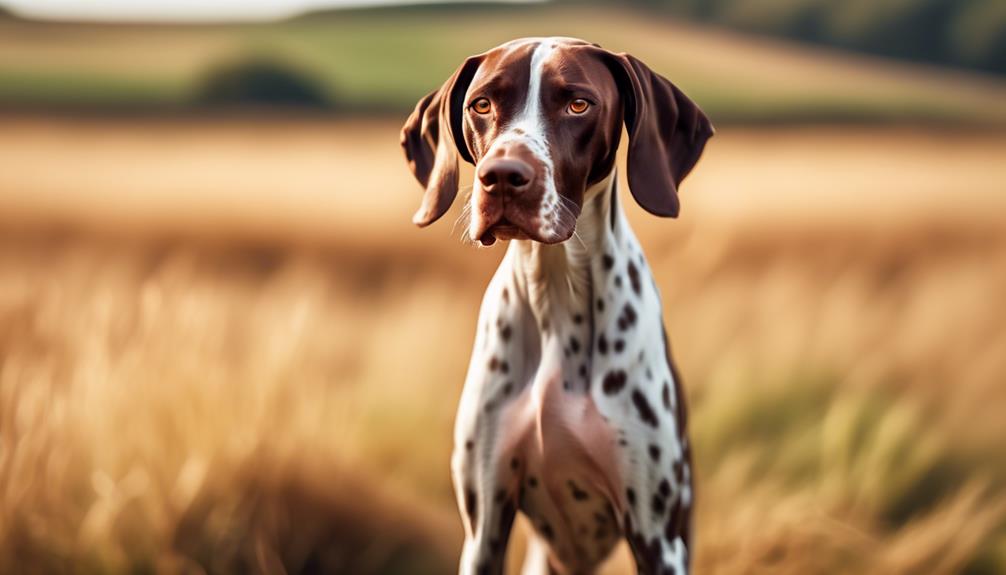
To understand the Portuguese Pointer’s tendency to bark or howl, it’s important to consider their breed characteristics and natural instincts. Some dog breeds are more prone to barking or howling. When choosing a breed, consider how often the dog vocalizes. Hounds, for example, are known for their trademark howls. A city full of suspicious strangers may put a watchdog on permanent alert. Consider noise restrictions and proximity to neighbors when choosing a dog breed.
| Tendency to Bark or Howl | Characteristics |
|---|---|
| Prone to barking or howling | Some dog breeds are more prone to barking or howling. |
| Hounds | Hounds, for example, are known for their trademark howls. |
| Urban living | A city full of suspicious strangers may put a watchdog on permanent alert. |
| Considerations | Consider noise restrictions and proximity to neighbors when choosing a dog breed. |
Wanderlust Potential

The Portuguese Pointer possesses a wanderlust potential that sets them apart from other dog breeds. Here are four important things to know about their wanderlust potential:
- Strong Desire to Explore: Portuguese Pointers have a natural inclination to explore their surroundings. They’re curious and always ready for an adventure.
- Need for Secure Boundaries: Due to their wanderlust potential, it’s crucial to provide Portuguese Pointers with secure boundaries. A sturdy fence or a leash is necessary to prevent them from wandering off.
- Training and Recall Skills: Training is essential to manage their wanderlust potential effectively. Teaching them reliable recall skills is crucial to ensure they come back when called, even when distractions are present.
- Exercise and Mental Stimulation: Providing Portuguese Pointers with ample exercise and mental stimulation is vital to satisfy their wanderlust potential. Regular walks, jogs, and interactive play sessions will help keep them mentally and physically fulfilled.
Understanding and addressing the wanderlust potential of Portuguese Pointers is crucial for their safety and overall well-being.
Exercise Needs

Understanding the exercise needs of Portuguese Pointers is essential for their overall well-being and to satisfy their energetic nature. These dogs are highly energetic and require plenty of exercise to stay happy and healthy. They thrive on physical activity and mental stimulation.
A Portuguese Pointer should ideally receive at least an hour of exercise every day. Activities such as hiking, walking, running, and playing catch are suitable for them. They enjoy being active and engaging in various physical activities.
Regular exercise not only helps to keep them physically fit but also helps to prevent behavioral issues that can arise from pent-up energy. So, make sure to provide your Portuguese Pointer with enough exercise to keep them content and fulfilled.
Potential for Playfulness

Portuguese Pointers are known for their playful nature and love to engage in various physical and mental activities. Here are four characteristics that highlight their potential for playfulness:
- Energetic and Active: Portuguese Pointers have high energy levels and enjoy being active. They’ll happily join you for a game of fetch, a long walk, or a run in the park.
- Playful with Children: These dogs have a friendly and gentle nature, making them great playmates for children. They love to participate in games and enjoy the company of little ones.
- Interactive Toys: Portuguese Pointers are intelligent dogs and enjoy mental stimulation. Interactive toys, such as puzzle toys or treat dispensers, can provide them with hours of entertainment.
- Playful with Other Dogs: Portuguese Pointers are generally sociable and get along well with other dogs. They enjoy interacting and playing with their canine companions, making them a great choice for multi-dog households.
Breed Characteristics and Overview
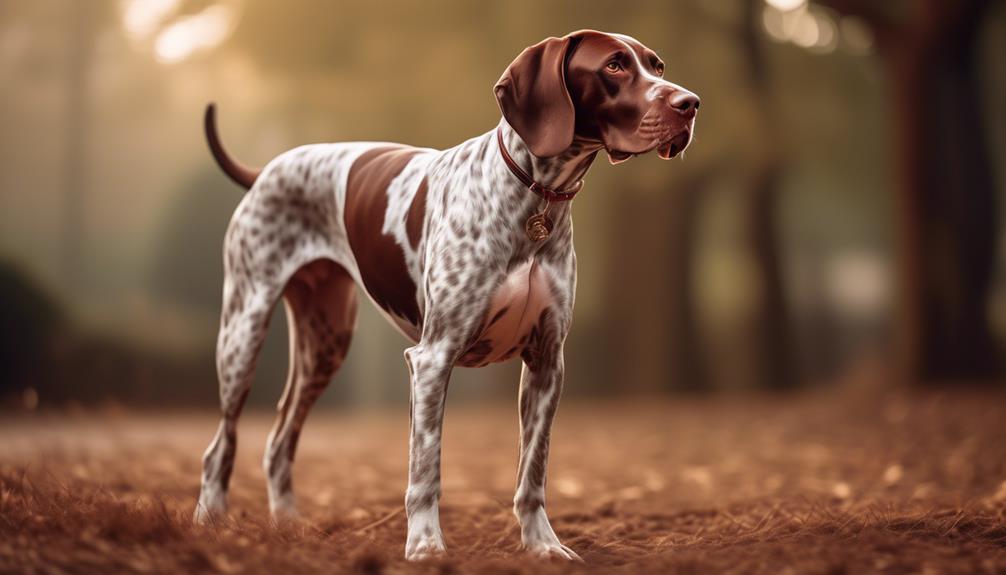
Explore the unique traits and qualities of the Portuguese Pointer dog breed.
The Portuguese Pointer is a medium to large-sized hunting dog from Portugal. They have a muscular build and a short, glossy coat.
Portuguese Pointers are known for their pointing ability and sense of smell, making them excellent hunting companions. They are also friendly and obedient, making them loyal and affectionate family pets.
These dogs are highly intelligent and easy to train. They have a playful and energetic nature, requiring plenty of exercise to keep them happy and healthy.
Despite their size, Portuguese Pointers have a low-shedding coat and require minimal grooming.
Frequently Asked Questions
Are Portuguese Pointers Good With Children?
Yes, Portuguese Pointers are good with children. They are affectionate and devoted to their families. With their friendly and obedient nature, they make excellent companions for kids and can create a strong bond with them.
How Do Portuguese Pointers Interact With Other Dogs?
Portuguese Pointers are generally friendly and sociable with other dogs. They enjoy playtime and can get along well in multi-dog households. Proper socialization and introductions are important to ensure positive interactions with other dogs.
Do Portuguese Pointers Have Any Specific Dietary Requirements?
Portuguese Pointers don’t have any specific dietary requirements, but it’s important to provide them with a balanced and nutritious diet. Consult with your veterinarian to determine the best diet for your Portuguese Pointer based on their age, size, and activity level.
Are Portuguese Pointers Prone to Any Specific Health Issues?
Portuguese Pointers are generally a healthy breed with a life expectancy of about 14 years. While they don’t have any known genetic disorders, they may be prone to minor concerns such as hip dysplasia, elbow dysplasia, patellar luxation, and autoimmune diseases.
How Much Grooming Does a Portuguese Pointer Require?
A Portuguese Pointer requires minimal grooming. Their short, dense coat only needs occasional brushing to remove any loose hair. Focus more on their exercise needs and training, as they are energetic and intelligent dogs.
Conclusion
In conclusion, the Portuguese Pointer is a loyal and versatile hunting companion that excels in both hunting and being a loving family pet. With their exceptional pointing ability and keen sense of smell, they’re highly intelligent and easy to train.
These energetic and playful dogs require plenty of exercise and mental stimulation, making them an ideal choice for active individuals or families. With their friendly and obedient nature, low-shedding coat, and minimal grooming needs, they’re also relatively low-maintenance.
Consider the Portuguese Pointer as your next loyal and devoted companion.




